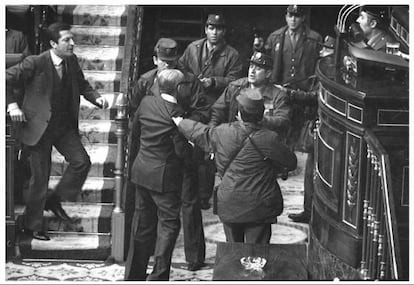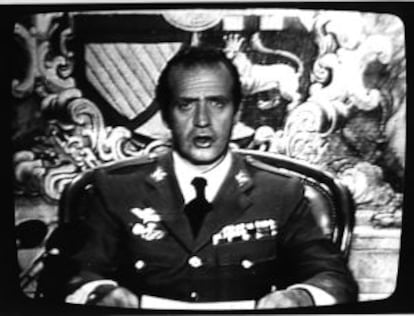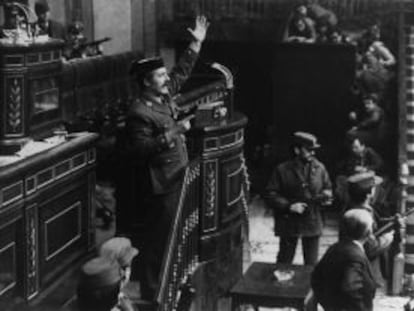Saying one thing and meaning another
The death of Adolfo Su¨¢rez is being used to spread old lies about the king's role in the failed coup

The death of Adolfo Su¨¢rez has prompted a variety of responses from Spain¡¯s political classes. To nobody¡¯s great surprise, many of those who loathed him while he was alive have made a great show of mourning his passing, while just about everybody else has tailored their comments to what they think Spaniards wish to hear. In other words, over the coming months a lot people will be saying one thing when they mean quite another.
Last Sunday, for example, the same newspaper that for years has peddled the conspiracy theory that ETA was responsible for the attacks on Atocha railway station in 2004, rather than Al Qaeda, published a full-page article claiming that far from helping to overcome the failed coup attempt of February 23, 1981, King Juan Carlos was in fact the mastermind behind it. In short, when he saw that the men tasked with overthrowing the government were going to fail, he switched sides.
In the wake of these supposed revelations, the current leader of the Communist Party-led United Left, Cayo Lara, who presumably hasn¡¯t read anything written by his predecessor, Santiago Carrillo, appeared on television to discuss the claims, made in a new book published by journalist Pilar Urbano, which, despite its length, makes few allegations that haven¡¯t been heard many times over the years.
¡°A decisive role¡±
¡°The king played a decisive role in dismantling the coup of 23 February. I am concerned about the ease with which the coup leaders are putting forward their defense, which consists of giving the impression that the king is responsible for all this, and that also attempts to involve the political parties. If this permissiveness does not stop, the men on trial could undermine the role of the king, which in my opinion is very clear.¡±
Santiago Carrillo in EL PA?S (19 March, 1982)
Mr Lara said that unless the Zarzuela, the king¡¯s official household, responded to the accusations, it was as good as confirming them. As if this wasn¡¯t enough, another television station, which has already organized a series of debates on the subject, had a few weeks earlier shown a documentary claiming that the coup had been organized by the king in order to give him more power, i.e., he was the only person who could lead the country out of chaos.
This campaign of smears and half-truths, breaking the most basic principles of journalism, has, to some extent, achieved its aim of sowing doubt in the minds of many people as to the role of the king in the 1981 coup. This comes precisely at a time when the monarchy is showing some signs of recovering its prestige, which has been dented in recent years by a number of scandals.
I have no time for conspiracy theories, and prefer to imagine that all this is the result of people¡¯s personal needs, of their lack of criteria, or desire for fame, none of which means that they are not causing a lot of harm at a particularly sensitive moment in this country¡¯s history. For years now rumors have been put about that we have not been told everything about what happened in February 1981. This is true insomuch as regards the role of civilians in the coup. But not knowing all the truth doesn¡¯t mean that what we do know is untrue. Those of us who lived through February 23, 1981, and who for one reason or another were in touch with the Zarzuela that night, as well as with politicians and the security forces, were witnesses to two events that in my opinion are irrefutable: the first, that the coup was initially successful; and the second, that the king¡¯s response was decisive in persuading the rebels to lay down their arms. They were subsequently tried and sentenced.
In the spring of 1980, I attended a conference on Spain¡¯s transition to democracy at Vanderbilt University. Among those also there were Manuel Fraga, Pilar Mir¨® and Juan Goytisolo. We listened to a talk given by historian Raymond Carr warning of the danger of a coup in Spain. He was not privy to any particular information: it was a widely held view in Spain at the time. The circumstances that led to the attempted overthrow of the government also threatened the government led by Su¨¢rez, who found himself under attack even by members of his own party, who wanted him out at any price, and were in cahoots with the Catholic Church, which opposed, for example, legislation allowing for divorce. The military also wanted him gone, because they wanted a free hand to take a tougher line with ETA and regions such as Catalonia and the Basque Country, which were demanding greater autonomy. The Socialist Party put forward a vote of no confidence that summer, which although not approved, further eroded Su¨¢rez¡¯s position. The economy was in tatters, unemployment was growing rapidly, and the financiers no longer had any faith in Su¨¢rez.
In other words, Su¨¢rez¡¯s decision to resign may have caught many people out, but it came as no surprise. Just about everybody, including the king, wanted rid of him. But as Su¨¢rez himself explained later on many occasions, he was not pushed; he jumped, believing it was the best thing for Spain at that moment.

He had been told of the planned coup, and had stood up to the military, but he never supposed that by resigning he was paving the way for the coup: ¡°Otherwise, I wouldn¡¯t have gone,¡± he told many people subsequently, including myself. I believe him, because he was not a coward. He also said on many occasions that after the coup he told the king he was prepared to resume office, something that highlights his morality and spirit of sacrifice, regardless of his inability to understand what was really going on in the country and the extent to which he was widely disliked by the electorate. When all is said and done, he had been unable to uncover and abort the coup, even though one attempt had already been discovered a few months earlier, the so-called Operation Galaxia.
All of this is well known, whatever certain sections of the media might try to have us believe, and has been published hundreds of times. Pilar Urbano¡¯s book is an interesting collection of anecdotes, but that has led the author to defend a thesis on a par with the Protocols of the Elders of Zion. Her book would simply have been one of many on the subject had the media to which I have referred not decided to garner an audience from it at any cost, a cost that includes undermining our democracy, which has already been sufficiently degraded by our politicians and is in no need of further erosion from other sections of society.
It seems as though Urbano has been overcome by the accumulation of information in her book, a sensation doubtless experienced by many of her readers. In this case, as with the internet, more information doesn¡¯t necessarily mean better information. The untruths that this avalanche of information and gossip has led to is probably due not so much to manipulation, as to an inability to analyze. Either way, the book is little more than a compendium of lies.
There is so much evidence and testimony relating to the king¡¯s decision to install democracy in Spain that it is almost embarrassing to have to cite them. A few days after Su¨¢rez resigned, King Juan Carlos told a BBC reporter: ¡°When I became king, what people wanted was to move toward democracy, and I shared that wish. All I did was take the first step in that process. The rest was done by the government.¡± Asked if power in Spain resided at the Zarzuela, the king answered: ¡°It did at one time. But it is difficult to say so now.¡±
Italian daily Corriere della Sera later published an article by the Socialist Party¡¯s Jorge Sempr¨²n that included part of an interview with the king shortly before the attempted coup. ¡°During our conversation I find him worried about the deteriorating political situation, but determined to deal with it constitutionally.¡± The king told Sempr¨²n that the armed forces ¡°should guarantee the free movement of our democratic institutions,¡± adding: ¡°It is easy to get the soldiers out of the barracks, but much more difficult to get them to return.¡± Sempr¨²n concluded his piece by saying: ¡°While everybody was waiting to see what Don Juan Carlos would do, I never doubted the decision he would make. It was clear that the armed forces would not have his support in dismantling parliament.¡±
This was demonstrated by the king¡¯s response to the Joint Chiefs of Staff, who presented him with a letter offering to remain in power while the government and deputies were being held hostage in Congress to avoid any power vacuum. The king rejected this, and instead formed a government of under secretaries so as to guarantee civil rule during the crisis.
Those of us who were there, and who have always known this, cannot fail to be astonished at the confusion that some sectors of society are trying to generate in the wake of Adolfo Su¨¢rez¡¯ death. His memory deserves better, as do the people of Spain. All the institutions of this country, starting with the crown, along with our political parties, the media, the courts, the financial system, etc., are now under suspicion: our usefulness or ability to deal with the current crisis is being questioned daily. For several years now, EL PA?S has been calling for Constitutional reform, which is essential if we are to pull our democracy from the mire into which our politicians have dragged it, and to create a shared project that will allow future generations to decide their own future. The indispensable requirement for this is to establish a rational and honest debate that will bring out the best in our politicians, and that will inevitably lead to some social unrest, but displaying the honesty and gravitas that Su¨¢rez showed on the day he stood down. And with the same courage that he showed toward the coup¡¯s leaders. There is still time.
Tu suscripci¨®n se est¨¢ usando en otro dispositivo
?Quieres a?adir otro usuario a tu suscripci¨®n?
Si contin¨²as leyendo en este dispositivo, no se podr¨¢ leer en el otro.
FlechaTu suscripci¨®n se est¨¢ usando en otro dispositivo y solo puedes acceder a EL PA?S desde un dispositivo a la vez.
Si quieres compartir tu cuenta, cambia tu suscripci¨®n a la modalidad Premium, as¨ª podr¨¢s a?adir otro usuario. Cada uno acceder¨¢ con su propia cuenta de email, lo que os permitir¨¢ personalizar vuestra experiencia en EL PA?S.
En el caso de no saber qui¨¦n est¨¢ usando tu cuenta, te recomendamos cambiar tu contrase?a aqu¨ª.
Si decides continuar compartiendo tu cuenta, este mensaje se mostrar¨¢ en tu dispositivo y en el de la otra persona que est¨¢ usando tu cuenta de forma indefinida, afectando a tu experiencia de lectura. Puedes consultar aqu¨ª los t¨¦rminos y condiciones de la suscripci¨®n digital.










































